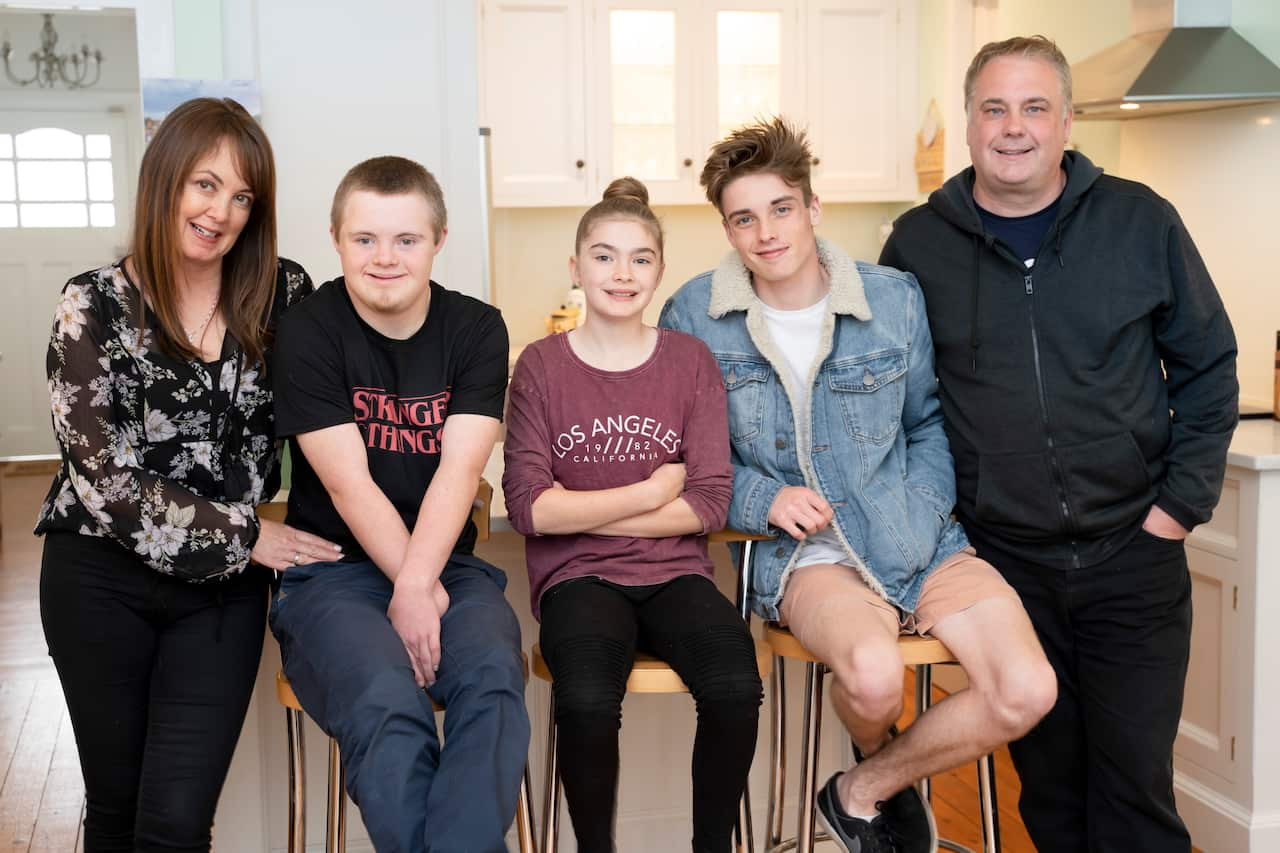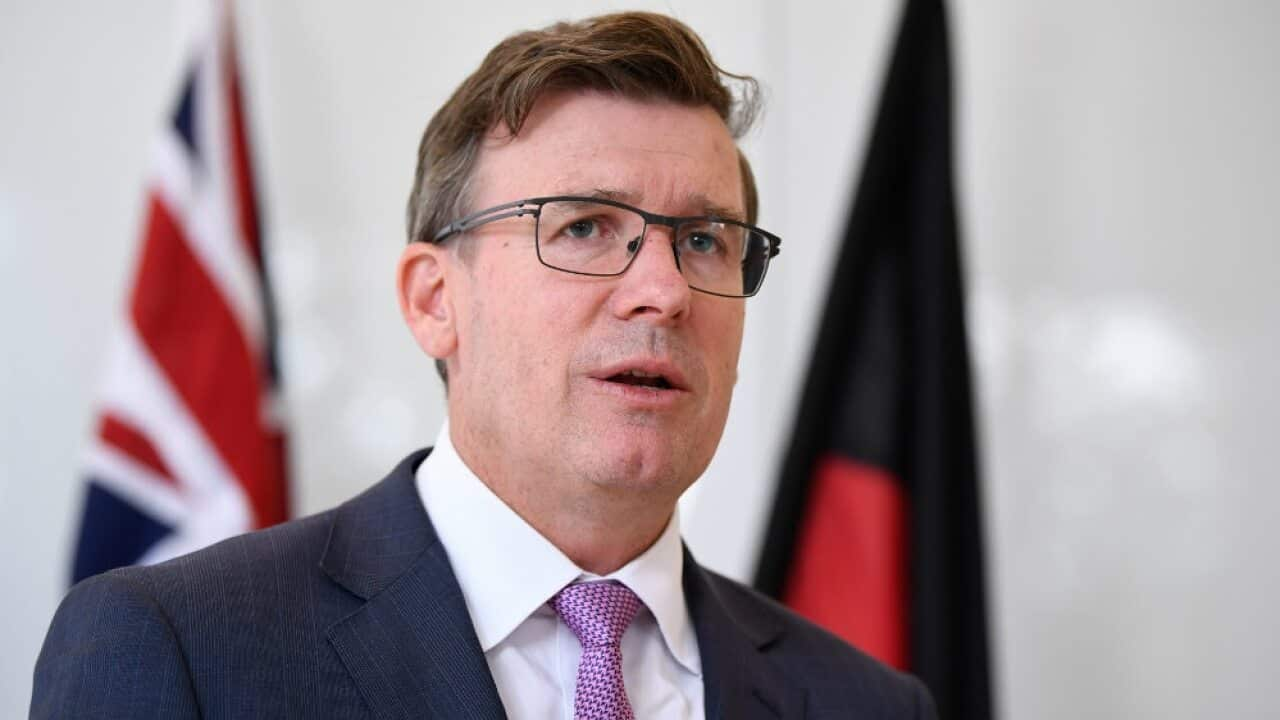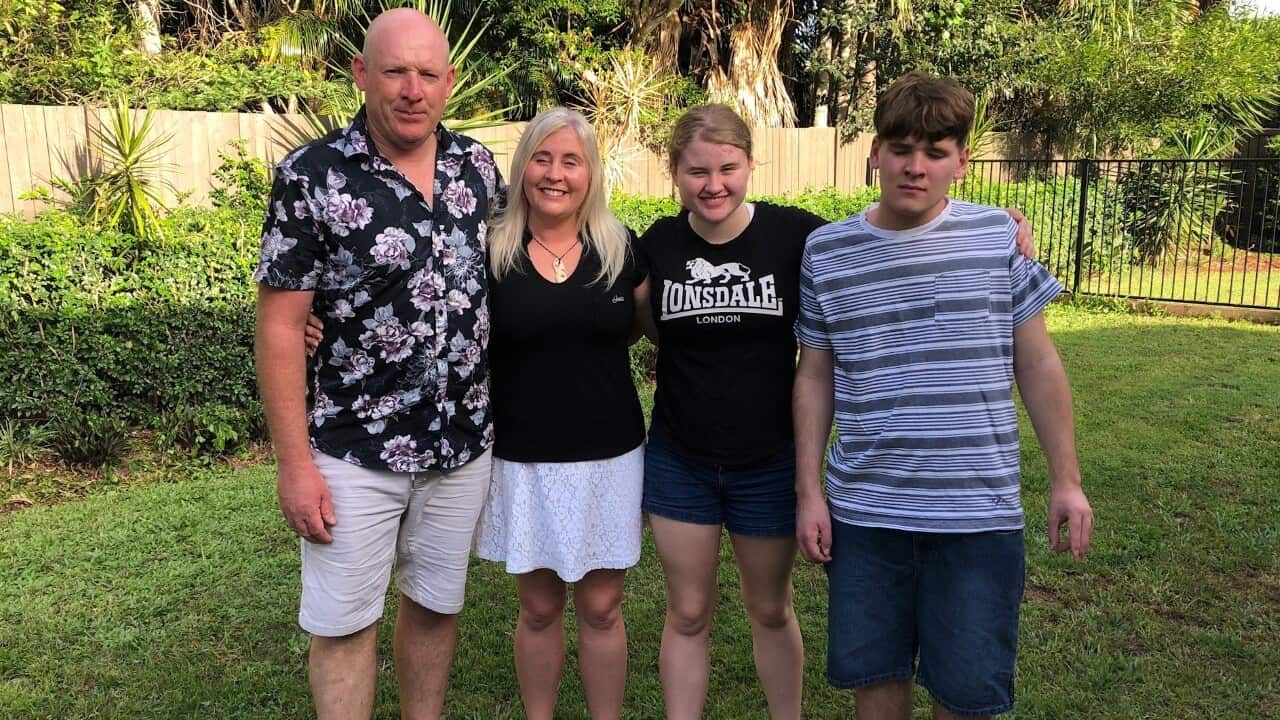

9 min read
This article is more than 4 years old
This family was given 35 days to leave Australia because one son has Down syndrome
Exclusive: After years living on Sydney’s northern beaches, Jason and Anita Lund were told their family was not eligible for permanent residency because one of their three children has a disability.
Published 25 June 2020 5:57pm
By Kate Sullivan
Image: The Lund family. (SBS)
Ciaran Lund has always loved music. When he was younger, growing up in the UK, it was all about Freddie Mercury.
Now he’s 16 and "the best dancer on the dancefloor”, his mum Anita tells SBS News.
If it isn’t music, he’s at the cinema or the beach.
“He’s just like any other typical teenager; he just wants to hang out with his mates.”
But Ciaran struggles when he's learning anything new. He has an intellectual disability as a result of his Down syndrome.
“It doesn't mean he doesn't have the capacity to learn, it just means he's slower,” Anita, 49, says.

Anita and Jason with their son Ciaran. Source: SBS
But when it came to their application to stay permanently on a 186 employer-sponsored visa five years later, they were refused.
Ciaran’s future healthcare needs were valued at a cost of more than $2 million to the Australian taxpayer, meaning he failed the government’s migration health requirement and rendered the entire family ineligible to stay.
“I remember that day,” Anita says. “Our immigration lawyer told us we'd got 35 days to leave the country. We were absolutely devastated."
“We expected some communication around being accepted into the country,” Jason, 48, says. “But deep down in our hearts, we didn’t think it would be an issue. It was quite difficult to take on board, we didn’t really understand the implications and we were scared.”
The family is speaking out for the first time and their story will feature in the upcoming SBS documentary series, Who gets to stay in Australia?, which follows the lives of 13 migrants and their families who want to settle in the country.
At the time of Ciaran’s initial assessment, the health requirement was based on a lifetime healthcare cost, but changes brought in last year mean it will now be assessed over a 10-year period .
“It falls under something called the Public Interest Criterion 4007,” the Lund family’s migration agent and lawyer Aleksandra Rajcevic says. “It is designed to protect, if you will, the Australian community from any dangers to public health or any prejudice to access. So if a child is assessed as being a heavy cost on the system, the entire family fails. It's a ‘one fails, all fail’ policy.”
The original figure quoted for Ciaran’s care “was taking into account residential care services, Commonwealth disability services, state facility services, special education services, things like that,” Ms Rajcevic says.
“But we know Ciaran is actually rather self-sufficient”.
The Lunds sought a review of the decision at the Administrative Appeals Tribunal, and have been waiting for more than 18 months for their case to be heard, with delays compounded by COVID-19. They expect to have a hearing date soon, and have requested a new medical opinion about Ciaran.

Anita and Jason with children Ciaran, 16, Sienna, 11, and Ewan, 17. Source: SBS
“When I speak to anyone who lives in Australia, including our 90-year-old neighbours next door, they're just absolutely gobsmacked that this kind of thing is allowed to go on,” she says.
But plenty of families have faced similar battles.
More than 25,000 applications for permanent residency are refused each year, but it’s unclear how many of them are on health grounds.
Back in 2008, German doctor Bernhard Moeller - who answered the call for help to fill medic shortages in regional Victoria - was told he couldn’t stay permanently because his 13-year-old son Lukas had Down syndrome.
And only this month, a Geelong family originally from Bangladesh was preparing to leave Australia after their five-year-old son Adyan bin Hasan’s minor disability in his hand - the result of a stroke around the time of his birth in an Australian hospital - deemed them ineligible.
After both cases received media attention and community support, a government minister stepped in to grant them a last-minute reprieve.
But some families don’t succeed in getting the decision overturned, and others choose not to continue with the financial and emotional cycle of appeals.
“We've jumped through hoops to help Ciaran settle here, he’s got a glowing report from his pediatrician, and from school, and he’s done work experience to prove he can join the workforce,” Anita says.
The family is also frustrated that no one assessed Ciaran in-person during the application process. His health costs are based on ‘a hypothetical person’ with his disability. “Throughout this entire process, no one has ever even met Ciaran … He's just a number, basically.”
Dr Ellen Skladzien is the CEO of Down Syndrome Australia. She says the health requirement aspect of the immigration system has given Australia a bad reputation.
“It's really quite sad. We hear from so many families overseas who are thinking about coming to Australia and they've heard from the media that Australia is not a place that welcomes people with Down syndrome,” she says.
“Australia is leading the way in so many ways with disability; we have the NDIS, we have incredible support for people with disability, but to be known internationally as a country that is turning people away ... It's really disappointing.”
Dr Skladzien points to the fact that Austrailia’s migration laws are exempt from the Disability Discrimination Act (1992), “so our government can discriminate based on disability”.
“Even if there's a positive outcome at the end [of a visa battle], what we need to do is change the rule so that people with disability aren't being discriminated against right now.”
For the Lunds, the not knowing is impacting the whole family. “It’s like a big black cloud hanging over us,” Anita says.
They’ve tried to shield Ciaran from the discussions around it, but “he knows something is going on”.
His big brother Ewan, 17, is all too aware.
“He's currently going through his HSC and has plans to go to university to study law, but currently as an overseas student that makes it very difficult for us from a financial point of view,” Anita says. He was also considering joining the Australian Army, but it's not possible with their current visa status.
“I understand that they have to have rules, I don't disagree with that. But I think the process is too long and I think they need to look at people who bring good things to Australia who are part of the community and bring jobs and investments,” Anita says.
After the family moved over for Jason’s job, Anita established her own training company and now employs more than 20 people.

The family hope to remain in Australia. Source: SBS
“There’s a real risk it invites a conversation about people with disabilities creating burden, that people with disabilities cost more to the public purse and to the government, and that their right to access healthcare and services is not something that Australians would be prepared to pay for,” she says.
Both Australian Lawyers for Human Rights and Down Syndrome Australia supported the launch of a campaign earlier this year which called on the Australian government to rethink its migration health requirement.
The Welcoming Disability campaign hopes to build a coalition of organisations who share their concerns and lobby MPs in Canberra for support later this year.
“At the root of every individual case, every review by the minister, and every Change.org petition that goes up is, fundamentally, the law. And the law needs to change,” Ms Wade says.
“So lawyers, advocates and members of the public can continue to fight this fight as they have been for a very long time now, but at the heart of it, they need to change the law.”
It is 10 years ago this month that a parliamentary committee handed down its Enabling Australia report after conducting the Inquiry into the Migration Treatment of Disability. Few of its recommendations have since been implemented and the campaign is calling for it to be re-examined.
A spokesperson for the Department of Home Affairs told SBS News the health requirement “does not discriminate against applicants who have a health condition, disability or illness, or a combination, with all applicants being treated in an equal and fair manner”.
The department does not comment on individual cases but the spokesperson said: “An applicant with Down syndrome is assessed in the same manner as an applicant with any other significant condition and the condition in itself will not result in a failure to meet the health requirement.”
“Where a visa delegate refuses to waive the health requirement, the visa applicant may seek review through the Administrative Appeals Tribunal (AAT). Ministerial Intervention is not an extension of the visa process. A person is able to request intervention, however the minister cannot be compelled to exercise his powers. What is in the public interest is a matter for the minister to determine.”
Who Gets To Stay in Australia begins at 8.30pm Wednesday 1 July on SBS. The Lunds’ story will air on 15 July.



